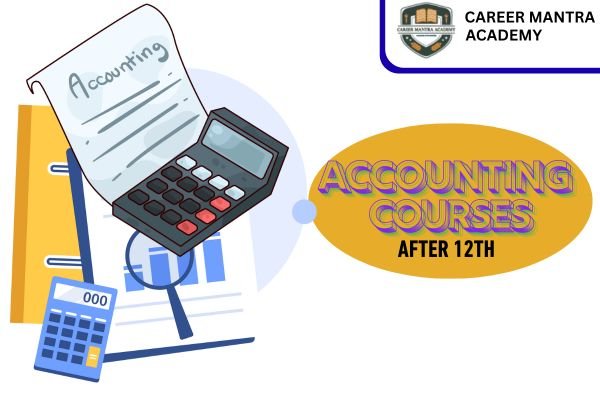
For Applying Accounting Course Click Here…
Why Should You Consider Accounting Courses After 12th?
One of the best career choices for students, particularly those with a background in commerce, is to pursue accounting courses after completing their 12th grade. The foundation of all organizations, businesses, and financial systems is accounting. Accountants are essential to decision-making and business expansion, handling everything from managing company finances and profit analysis to guaranteeing tax law compliance.
The abundance of opportunities in accounting is one of the main arguments for considering it after 12th grade. In addition to degree programs like B.Com. Or BBA in accounting, students can pursue professional courses like Chartered Accountancy (CA), Cost and Management Accounting (CMA), or Company Secretary (CS). These courses prepare students for the workforce by giving them both theoretical knowledge and real-world experience through training and internships.
The stability and demand of this career are two more significant benefits. To manage their books, taxes, and audits, all businesses, no matter how big or small, need qualified accountants. Accounting specialists are also in demand in banks, finance firms, multinational corporations, and even startups as a result of globalization and digitization. In addition to attractive compensation packages, this guarantees steady job security.
Furthermore, accounting isn’t just for jobs. Additionally, students can pursue careers as entrepreneurs, tax advisors, or independent consultants. Its appeal is increased by the opportunity to work in both the public and private sectors.
In summary, taking accounting courses after high school can lead to a variety of career options, financial security, and long-term professional development, making it a great option for aspirational students.
What Is the Scope of Pursuing Accounting After 12th?
With the growing demand for financial management across industries, there is a wide range of opportunities to pursue accounting courses after the 12th grade. In addition to businesses, government agencies, banks, startups, and even individuals who need tax management and financial planning depend on accounting.
After completing their 12th grade, students who choose accounting can pursue careers in corporate finance, taxation, auditing, investment banking, and consulting. Career prospects with international recognition are further improved by professional courses like CA, CMA, or CPA. The need for tech-savvy accountants is growing as a result of digital tools like Tally, ERP, and GST software.
Key Scope Areas in Accounting:
- Jobs in corporate companies, banks, and financial firms
- Careers in auditing, taxation, and consulting
- Opportunities in the government and public sector units
- Freelancing as a tax advisor or accountant
- Global opportunities through courses like CPA or ACCA
Which Are the Best Accounting Courses After 12th Commerce that Students Can Choose?
Many students want to work in business or finance after completing their 12th-grade education. After completing a 12th-grade commerce course, selecting the appropriate accounting program can lead to lucrative employment, career advancement, and even international opportunities. Here are a few of the top choices, each thoroughly explained:
1. B.Com in Accounting and Finance
After 12th commerce, this is one of the most popular undergraduate courses. It offers a solid foundation in finance, taxation, business laws, and accounting principles. For students seeking a combination of theoretical and practical knowledge, the three-year degree is ideal. Graduates can pursue professional courses or further education, such as an M.Com. Oran MBA, or they can work in banks or finance companies.
2. BBA in Accounting
A BBA in accounting is a great option for students who wish to gain managerial experience. It emphasizes accounting, finance, and business administration. Students who earn this degree develop leadership and management skills in addition to financial knowledge, which prepares them for corporate work and MBA programs in the future.
3. Chartered Accountancy (CA)
After the 12th grade, one of the most prestigious and in-demand accounting programs is the Certified Public Accountant (CPA) program. It consists of Foundation, Intermediate, and Final stages and is administered by the Institute of Chartered Accountants of India (ICAI). Accounting, auditing, taxes, and corporate law are all covered in the course. A CA degree guarantees well-paying positions in audit firms, multinational corporations, banks, and even as an independent practitioner, despite the fact that it is difficult.
4. Company Secretary (CS)
The CS course is an excellent substitute if corporate law and compliance are your areas of interest. This course, which is provided by the Institute of Company Secretaries of India (ICSI), prepares students to handle governance, legal issues, and corporate rules. Because of their close collaboration with company boards, computer scientists play a crucial role in business operations.
5. Cost and Management Accounting (CMA)
Financial strategy, budgeting, and cost accounting are the main areas of focus for CMAs. It is ideal for students who wish to work in organizations in decision-making, cost-management, or financial planning positions. CMAs, who are trained by the Institute of Cost Accountants of India, frequently land positions in corporate finance, consulting, and manufacturing.
6. Certified Public Accountant (CPA)
For students hoping to work overseas in nations like the USA, Canada, or Australia, the Certified Public Accountant (CPA) credential is highly regarded worldwide. International accounting standards, taxes, and auditing are its main topics. Although a graduation degree is typically required to pursue a CPA, beginning preparation after the 12th grade helps establish a solid foundation.
7. Diploma in Accounting & Taxation
Diploma programs are an excellent option for students seeking a faster route to employment. Typically lasting six months to a year, a diploma in accounting and taxation covers financial accounting, payroll management, GST, and tax laws. It equips students to work as tax consultants or in entry-level positions in businesses.
8. Tally and GST Courses
Training programs for Tally ERP and GST are short-term certifications that emphasize useful accounting abilities. Students who wish to work as junior accountants or assistants right after high school can benefit from these job-oriented courses. To improve employability, they are frequently paired with diploma programs.
Should You Go for Short-Term or Long-Term Accounting Courses After 12th?
Your career goals will determine whether you enroll in long-term or short-term accounting courses after high school. Job-oriented short-term courses like Tally, GST, or the Diploma in Accounting & Taxation are appropriate for students who wish to obtain practical skills in a few months or who wish to find employment quickly. These classes get you ready for entry-level positions in small businesses or accounting firms.
However, longer-term programs like B.Com, BBA, CA, CMA, or CS offer a more thorough comprehension of management, accounting, and finance. Although they take three to five years, they provide access to professional, well-paying jobs with better prospects for advancement.
Choose professional or degree courses if you want long-term success and recognition; if you want quick money, go short-term.

Who Is Eligible for Accounting Courses After 12th?
The type of program you select largely determines your eligibility for accounting courses after the 12th grade. Students must have completed 12th grade, ideally in the commerce stream, with mathematics, economics, or business studies as subjects, in order to enroll in most degree programs, such as B.Com in Accounting and Finance or BBA in Accounting. College-specific cut-offs vary, but generally speaking, a minimum of 50% is expected.
Regardless of stream, professional courses like CS, CA, or CMA can also be pursued immediately after 12th grade, but commerce students adjust more readily. After completing their 12th grade, students from any stream can apply for short-term options such as the Diploma in Accounting, Tally, or GST. Although non-commerce students are also eligible, commerce students clearly have an advantage overall.
What Skills Do You Need to Succeed in Accounting?
Students need a combination of technical and soft skills to excel in accounting courses after high school and have a successful career. First, handling numbers correctly requires a strong grasp of mathematics and analytical thinking. While problem-solving abilities aid in the interpretation of data for decision-making, attention to detail guarantees error-free financial records.
In today’s digital world, familiarity with computer programs and accounting software such as Tally, Excel, or ERP systems is also essential. Professional success is largely dependent on soft skills like communication, time management, and organizational ability, in addition to technical proficiency.

What Career Opportunities Open Up After Completing Accounting Courses?
Completing accounting courses after 12th opens up a wide array of career opportunities in diverse sectors. Whether you pursue degree courses like B.Com or professional programs like CA, CMA, or CS, there are roles for every skill level. Here are the main career paths:
1. Accountant / Junior Accountant
- Entry-level role for students completing short-term courses like Tally, GST, or diploma programs.
- Responsible for maintaining financial records, preparing invoices, and managing day-to-day accounts.
- Opportunities exist in small businesses, private firms, and startups.
2. Chartered Accountant (CA)
- CAs handle auditing, taxation, corporate finance, and consulting.
- They can work in CA firms, multinational companies, banks, or as independent consultants.
- High demand and attractive salary packages make CA a prestigious career option.
3. Cost and Management Accountant (CMA)
- Focuses on budgeting, cost management, and financial strategy.
- Works in manufacturing companies, finance departments, and consultancy firms.
- CMA professionals assist in decision-making and financial planning.
4. Company Secretary (CS)
- Handles corporate governance, legal compliance, and company regulations.
- Works directly with company boards and senior management.
- Offers opportunities in corporate law firms, multinational corporations, and government organizations.
5. Tax Consultant / Tax Advisor
- Specializes in income tax, GST, and corporate taxation.
- Can work in tax consultancy firms or as an independent professional.
- Short-term courses like GST or diploma programs provide the foundational knowledge.
6. Auditor / Internal Auditor
- Responsible for verifying and analyzing financial statements to ensure accuracy.
- Opportunities exist in banks, corporate firms, and government institutions.
- Professional courses like CA, CMA, and CPA enhance credibility in this role.
7. Financial Analyst
- Analyzes financial data to help businesses make investment and strategic decisions.
- Works in banks, stock markets, financial advisory firms, and multinational companies.
- Knowledge of accounting, statistics, and analytics is crucial for this role.
8. Banking and Insurance Jobs
- Accountants are in demand in the banking sector for managing accounts, loans, and audits.
- Insurance companies hire finance professionals for premium management and risk analysis.
- Roles include banking associate, credit analyst, and financial officer.
9. Investment Banker
- Helps companies raise capital and manage mergers and acquisitions.
- Requires strong accounting, finance, and analytical skills.
- Professionals with a B.Com, BBA, or CA background have an advantage.
10. Payroll and Finance Executive
- Handles salaries, payroll management, and employee benefits in companies.
- Short-term accounting courses or diploma programs can lead to these roles.
- Ideal for students seeking quick employment after 12th.
11. Freelancing / Self-Employment
- Students can work independently as accountants, tax advisors, or consultants.
- Opportunities in bookkeeping, GST filing, and financial advisory are growing.
- Short-term courses in Tally or GST can help build practical experience.
12. International Opportunities (CPA / ACCA)
- Pursuing global accounting certifications like CPA or ACCA opens doors abroad.
- Students can work in multinational corporations, investment firms, or consulting agencies.
- Provides global exposure and higher salary potential.
8. How Much Salary Can You Expect After Accounting Courses?
| Accounting Course | Starting Salary (Per Year) | Career Opportunities |
| B.Com in Accounting and Finance / BBA | ₹1,80,000 – ₹3,60,000 | Banks, finance firms, corporate accounting roles |
| Chartered Accountant (CA) | ₹6,00,000 – ₹18,00,000 | Banks, finance firms, and corporate accounting roles |
| Cost and Management Accountant (CMA) | ₹4,80,000 – ₹14,40,000 | Budgeting, cost analysis, corporate strategy |
| Company Secretary (CS) | ₹4,20,000 – ₹12,00,000 | Corporate governance, legal compliance |
| Diploma in Accounting & Taxation | ₹1,44,000 – ₹3,00,000 | Entry-level accountant, tax assistant |
| Tally & GST Certification Courses | ₹1,44,000 – ₹3,00,000 | Junior accountant, bookkeeping, tax filing roles |
How Do You Choose the Right Accounting Course After 12th?
Your time commitment, interests, and career goals will all play a role in selecting the best accounting course after high school. Determine your goals first: a long-term professional career or skills that will get you a job quickly. Courses like CA, CMA, CS, B.Com, or BBA are best for long-term development. Diploma programs in Accounting & Taxation, Tally, or GST are ideal for temporary work.
Next, think about your eligibility and strengths. While non-commerce students can begin with diplomas or certifications, commerce students might find professional courses easier. If you want to work abroad, you should also look at the courses and the institute’s recognition, placement opportunities, and global reach. You can choose a course that best suits your interests and career goals by considering these factors.
Conclusion.
After completing grade 12, enrolling in accounting courses provides a route to a steady, fulfilling, and adaptable career. Every option offers worthwhile skills and career opportunities, whether you decide on professional courses like CA, CMA, or CS, or degree programs like B.Com. Or BBA, or short-term diplomas and certifications. Through certifications like CPA, accounting not only provides access to corporate employment, banking, and finance, but it also enables independent practice and worldwide exposure.
You can choose the best course that guarantees development, skill improvement, and financial stability by carefully assessing your interests, strengths, and career goals. Accounting can serve as a springboard for long-term career success and a prosperous career in business and finance, provided the right support and commitment are in place.
FAQs
Which course is best for an accountant after 12th?
The best course for an accountant after 12th depends on your career goals. For long-term professional growth, Chartered Accountancy (CA), Cost and Management Accounting (CMA), or Company Secretary (CS) are ideal, offering high-paying roles and global recognition. If you prefer a degree, B.Com in Accounting and Finance or BBA in Accounting provides strong foundational knowledge. For quick job readiness, Diploma in Accounting & Taxation, Tally, or GST courses help start an accounting career immediately.
Can a 12th pass become an accountant?
Yes, a 12th pass can become an accountant. After completing 12th, students—especially from commerce—can start with short-term accounting courses like Tally, GST, or a Diploma in Accounting & Taxation. These courses provide practical skills for entry-level accounting jobs.
For a professional career, students can also enroll in courses like B.Com in Accounting, BBA in Accounting, CA, CS, or CMA after 12th. With dedication, proper training, and experience, a 12th pass student can grow into roles such as accountant, auditor, tax consultant, or financial analyst.
Which accounting course is easy?
The easiest accounting courses after 12th are generally short-term, practical courses like Tally, GST, or a Diploma in Accounting & Taxation. These courses focus on basic accounting principles, bookkeeping, and taxation without requiring extensive theoretical study. They are ideal for beginners or non-commerce students who want to start an accounting career quickly and gain hands-on skills for entry-level jobs in accounting firms, businesses, or freelancing.
What is the best career in accounting?
The best career in accounting depends on your goals, but the most prestigious and rewarding paths include Chartered Accountant (CA), Cost and Management Accountant (CMA), and Company Secretary (CS). These roles offer high salaries, global recognition, and opportunities in corporate finance, auditing, taxation, and consultancy. For degree holders, a B.Com or BBA in Accounting can lead to roles like financial analyst, auditor, or tax consultant. Short-term courses like Tally or GST are best for quick entry-level jobs.
What is a CMA course?
The CMA (Cost and Management Accounting) course is a professional accounting program focused on cost management, budgeting, financial planning, and decision-making for businesses. It is offered by the Institute of Cost Accountants of India (ICMAI).
CMA professionals help organizations optimize costs, analyze financial performance, and plan strategic growth. The course has multiple levels, including Foundation, Intermediate, and Final. Completing CMA after 12th (with a commerce background) or graduation equips students for high-paying roles in corporate finance, cost auditing, management accounting, and consultancy, making it a highly respected career in accounting.
What type of accountant is in most demand?
The most in-demand accountants today are Chartered Accountants (CA), Cost and Management Accountants (CMA), and Tax Consultants. Companies also seek accountants skilled in Tally, GST, and financial analysis, especially those familiar with digital tools and ERP software. Professionals who combine technical accounting knowledge with analytical and compliance skills are highly sought after across corporate, banking, and consultancy sectors.
What are the 7 types of accounting?
Accounting is divided into several types based on purpose and function. The 7 main types of accounting are:
1. Financial Accounting – Records and reports business transactions for external stakeholders.
2. Management Accounting – Provides internal reports to help managers make decisions.
3. Cost Accounting – Analyzes production and operational costs to improve efficiency.
4. Tax Accounting – Focuses on tax calculation, filing, and compliance.
5. Auditing – Examines financial statements to ensure accuracy and compliance.
6. Forensic Accounting – Investigates financial fraud and legal disputes.
7. Government Accounting – Manages finances and budgets for government entities.
Each type serves a specific purpose and career path, offering diverse opportunities for accounting professionals.
What is the scope of the accounting?
The scope of accounting is vast and growing, as every business, organization, and government needs skilled accountants. It includes financial reporting, auditing, taxation, cost management, and consultancy. With globalization and digital tools, accountants are in demand in corporate firms, banks, startups, and government sectors, offering diverse career opportunities, job security, and potential for high salaries.
What is the difference between bookkeeping and accounting?
Bookkeeping and accounting are closely related but serve different purposes in financial management. Bookkeeping is the process of recording daily financial transactions, such as sales, purchases, receipts, and payments. It focuses on maintaining accurate and organized records using tools like ledgers, journals, or software like Tally. Bookkeepers ensure that all financial data is documented properly, forming the foundation for further analysis.
Accounting, on the other hand, involves analyzing, interpreting, and summarizing financial data collected through bookkeeping. Accountants prepare financial statements, conduct audits, manage taxes, and provide insights for decision-making and business strategy. In short, bookkeeping is about recording, while accounting is about understanding and using financial information to guide business decisions.
